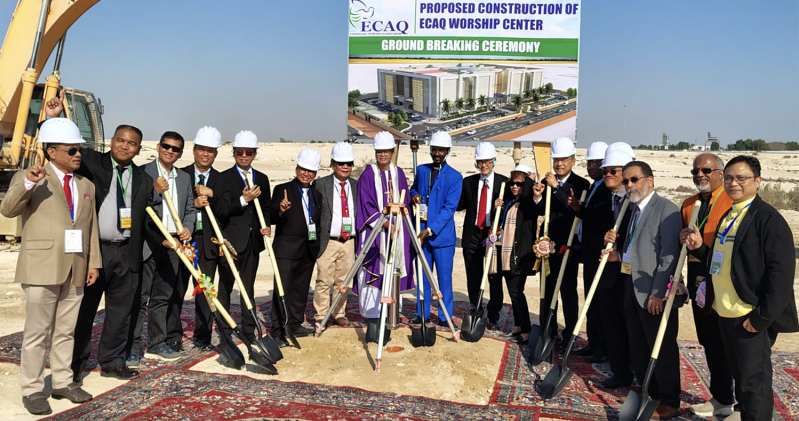
The World Evangelical Alliance (WEA) has joined the Evangelical Churches Alliance in Qatar (ECAQ) in a ceremony held on Jan. 24 to break ground for a planned worship center for evangelical Christians near the capital of the Middle Eastern country.
The US $50 million project that will provide space for up to 10,000 worshippers simultaneously is to be built on land leased free of charge from the government. Yet, the small Alliance made up primarily of foreign workers seeks support from the WEA and international partners to overcome the challenge of raising the necessary funding to construct the center within the required 5-year period ending in 2028.
A small peninsular Arab country, most of Qatar’s population of 2.7 million is made up of expatriates (88%). Around 15% of the population identify as Christians, representing primarily a diverse mix of Asian, African, European, and North and South American foreign workers.
As a Muslim-majority nation, Qatar enforces strict rules on religious activities. While it permits expats belonging to registered faith groups to worship among themselves, evangelism is forbidden, and Muslims may not convert to any other religion.
For decades, churches made up of evangelical expats have worshiped in private homes and rented spaces but did not have the right to build churches. Now they received permission from the Qatari government along with leased land to build a worship complex that could become home to all the churches affiliated with the government-recognized evangelical Alliance, ECAQ.
Building a worship center for evangelical expats in Qatar
The plot of land is located on the Mesaimeed Religious Complex in the Abu Hamour area outside of Doha where the Qatar government and representatives of several other Christian groups signed a 50-year lease agreement in 2005 to allow registered churches to build worship centers for their expat communities. The Roman Catholic Church, the Anglican Church, the Syrian and Greek Orthodox Churches are among the eight groups that already built churches in the complex.
After seven years of lobbying by ECAQ, the Qatari government also granted evangelicals one hectare of land ten years ago. A groundbreaking ceremony was held in October 2015, but the land was later reclaimed by the government due to its strategic location.
As a result, ECAQ renewed its appeal for a new site and the government provided a new plot – twice the size of the original – in November 2023. However, the increased land area also significantly raised the cost of constructing the new church building, according to ECAQ.
It envisions that the worship center will house worship halls, a bookstore, a coffee shop, and spaces for weddings and events to generate revenue.
“Once built, the building will have three floors for services and worship, and an auditorium that will house a meeting with a seating capacity of up to 1,700. Additionally, there are many different size church meeting venues across the design, varying from sizes of 50 up to 500 people along with its own parking facilities. Upon completion, it is hoped that the worship center will be able to host 10,000 worshipers simultaneously,” ECAQ says.
Looking to the World Evangelical Alliance and Korean churches to overcome funding challenges
Formed in 2005 by Filipino churches, ECAQ says its membership nowadays includes 128 churches that vary in size from a few hundred members to several thousand. It estimates its constituency at just over 17,000 church members, a majority of which are Filipinos, along with Africans, Indians, Arabic Christians, Sri Lankans, Nepalese, Indonesians and Korean churches.
In a promotional video for the new worship center, the Alliance expresses its gratitude to the Qatari government for providing the land but adds, “While the land has been donated, the building, however, needs to be built at ECAQ's own expense.”
“Raising funds for this incredible project is a significant challenge with the total cost of the project estimated to be 50 million US dollars,” the group says.
Many churches are small, with members who may not have the financial means to independently fund construction while also covering rental costs for their current worship spaces, ECAQ says. Many congregants are workers and laborers from across the country who have moved to Doha for employment.
ECAQ also points to “a five-year timeline that has been given by the Qatari government for the completion of the project. This understandably puts much pressure on all available resources.”

Therefore, they have been looking for international sponsors hoping the project will come to fruition “through the financial and prayerful support of WEA” and other partners. In the architectural drawings, the WEA logo is also featured prominently alongside ECAQ’s logo on the front of the building.
In his congratulatory speech, WEA Deputy Secretary General for Ministries Rev. Samuel Chiang described the ceremony “as a milestone of our collective faith as well as God’s unwavering faithfulness and provision.”
“The building of the worship center is more than architectural, it is a spiritual act of worship, a manifestation of our faith in the God who calls us to both envision and enact His kingdom on earth.”
Rev. Chiang was joined by Rev. Yeonjong Ju, Associate Pastor of Sarang Church in Seoul, Korea, which is due to host the upcoming WEA General Assembly in October and provides most of the funding for the event. Rev. Ju’s presence suggests that the WEA and ECAQ may be looking to Korean churches to provide financial support for the multimillion-dollar project.
With the fundraising theme of “Building a Monumental Legacy Together In the Middle East For His Glory”, ECAQ expressed its hope that “the completion of this project will act as a catalyst in advancing WEA’s vision for the future of the Gospel, serving as a launching pad for the empowerment of churches in evangelism and discipleship.”
Reflecting on the groundbreaking ceremony, ECAQ President Bishop Beda Robles commented, “May our loving Jesus be glorified and known by the whole world! May Our God of heaven himself prosper and gives us success as we His people (Evangelical) arise and build this project together (John 17:20-21). All for His glory and honor and for the future of the Gospel in furtherance of His Kingdom in the Muslim world.”
Religious freedom situation remains dire in Qatar
Despite the Qatari government’s acceptance of expat Christian communities and the provision of land for registered churches to build worship centers, religious freedom in the country remains severely restricted.
According to the 2023 US State Department report on religious freedom in Qatar, conversion from Islam to another religion is legally considered apostasy and is prohibited by law, though no recorded punishments have been carried out since the country gained independence in 1971.
“Proselytizing on one’s own accord for any religion other than Islam may result in a sentence of up to five years’ imprisonment. The law calls for two years’ imprisonment and a fine of 10,000 riyals ($2,700) for possession of written or recorded materials or items that support or promote missionary activity,” the report adds.
Qatar is also ranked 41st among Open Doors’ 2025 World Watch List of countries where Christians face most pressure for their faith.
“Christians in Qatar are either workers from non-Muslim countries, or people from Muslim backgrounds – and the two rarely interact,” Open Doors writes.
While referring to the religious complex that provides a space for expat Christians to worship, it adds that “Qatari citizens are not allowed to enter, and migrant Christians must not speak about Christianity to Muslims. If they do, they may be arrested or deported.”
Qataris and migrants from Muslim backgrounds who follow Jesus cannot openly practice Christianity and may face discrimination, harassment, and police surveillance, according to Open Doors.
“Qatar is increasingly using advanced technology to monitor both citizens and immigrants. This has caused Christians in Qatar to become increasingly careful about their activities. There are few reports of Christians being physically harmed for their faith, because believers from Muslim backgrounds keep their faith secret.”





